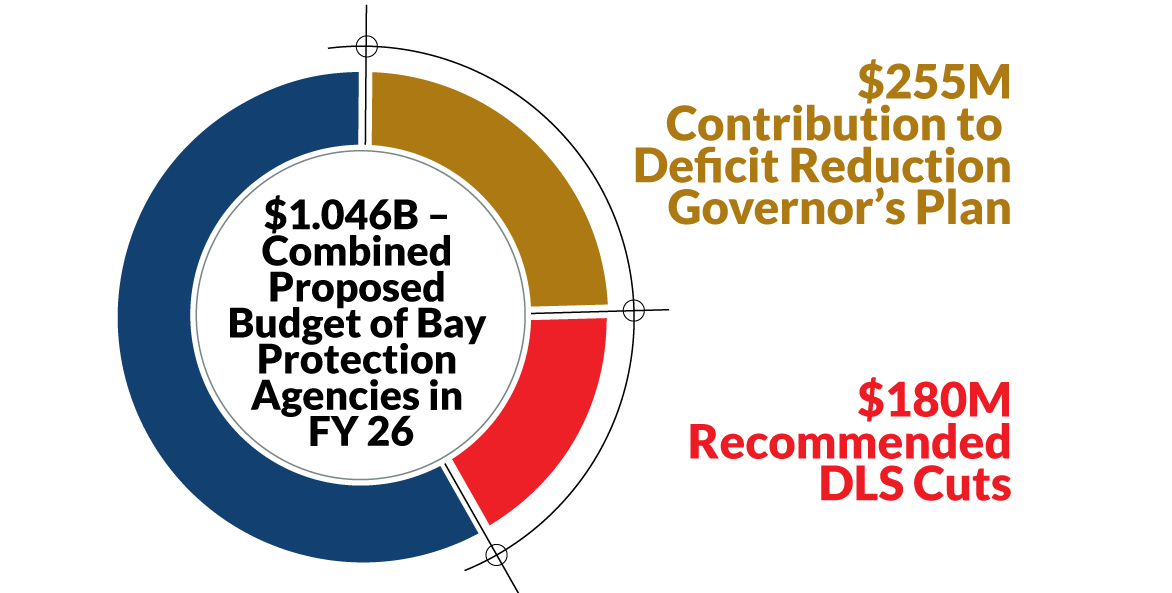Updated March 18, 2025
Maryland is at a critical point for the Chesapeake Bay and its waterways, seeking to continue moving forward on Bay restoration amid unprecedented budget challenges and a worsening outlook at the federal level.
Supporting a Bay-Focused Budget
Maryland is facing a Fiscal Year 2026 deficit of over $3 billion dollars, a number that is expected to grow in the years ahead. In lean budget times the programs that support clean water have been popular places for governors and legislators to borrow from to bridge temporary shortfalls. Borrowing from or repurposing funds like Program Open Space or the Bay Restoration Fund can help solve short-term crunches, but the longer-term impact on the Bay can be a shortsighted trade.
In Governor Moore’s proposed budget, the Departments of the Environment (MDE), Natural Resources (DNR), Agriculture (MDA), and the Maryland Energy Administration (MEA)—the state agencies tasked with protecting the Bay—were set to make significant contributions to balancing the budget. While those agencies have a combined proposed budget of $1.046 billion in FY 26, they are slated to collectively contribute well over $255.4 million to deficit reduction in the Governor’s budget plan.

Suggested cuts from the Department of Legislative Services (DLS) would add at least another $180 million annually to that total. Some cuts are proposed to last for multiple years, effectively ending popular and successful programs like Program Open Space and the Chesapeake and Atlantic Coastal Bays Trust Fund, our most impactful program to reduce non-point source pollution in the agricultural sector. Fortunately, advocacy from CBF members like you appears to have staved off the worst potential cuts—for now. We will need your continued engagement to save our bay-focused programs.
Investments in clean water and air are investments in Marylanders.
Urge state legislators to protect environmental funding!
Take Action
Creating a Shared “Bay Legacy”
At the recent Chesapeake Bay Program Executive Council meeting, Gov. Moore announced that his administration would be introducing legislation to address several key Bay restoration priorities during the 2025 legislative session. These items address some of the most pressing needs and recommendations identified in the May 2023 Comprehensive Evaluation of System Response (CESR) report. CBF will be working with the administration and General Assembly to pass the Bay Legacy Act (SB 428 / HB 506), which advances several critical Bay priorities:.
Promoting Regenerative Agriculture on Public Lands
Despite significant population growth, agriculture remains the largest land use in Maryland with nearly 2 million acres—roughly 32 percent—of total land area in agricultural use. This means that agricultural runoff remains one of the state’s greatest challenges to improving Bay health but also one of its biggest opportunities. Regenerative agriculture is an approach to farming that not only protects soil from erosion, but helps to rebuild the health of the soil, reduce nutrient inputs, improve biodiversity, and sequester carbon. With the State of Maryland as one of the largest agricultural landowners in the state, instituting more regenerative agriculture practices on state-owned lands has significant potential to generate water quality gains and demonstrate the effectiveness of regenerative agriculture to private landowners.
Creating a 21st Century Monitoring Network
Tracking Bay restoration progress and outcomes is critical to the long-term success of our efforts and to continued improvement in implementing the most effective practices to achieve nutrient and sediment reductions. That’s where on-the-ground monitoring comes in. By creating a statewide monitoring network and data hub, housed in the Department of Natural Resources, Maryland can more effectively track our pollution reduction goals, identify the most impactful practices, and refine state investments to produce the greatest ‘bang for the buck.’
Supporting Maryland’s Aquaculture Industry
Shellfish aquaculture—the cultivation of native oysters and clams—has tremendous potential to improve water quality, bolster fish habitat, and provide sustainable economic opportunities for Marylanders. However, Maryland’s industry has been stifled by long lease application timelines, redundant regulations, and out-of-date reporting structures. Improving these processes will allow the Maryland industry to operate more efficiently, hopefully attracting more private investment.
Being a Trusted Conservation Partner and Leading Through Science
CBF has been a leader in ensuring that Bay restoration efforts follow the best available science. We continue to play that critical role in the 2025 legislative session. Some bills and initiatives we have weighed in on include:
- The Nearshore Farm & Financing Act (SB 898/HB 1175): This legislation will increase nutrient application setbacks near sensitive waters and provide additional incentives for farmers to plant trees, shrubs, and other natural filters that keep nutrient runoff out of our waterways. Unfortunately, the Nearshore Farm & Financing Act did not advance out of committee before the legislative crossover deadline, however we remain committed to including buffer planting incentives in other legislation;
- Monitoring efforts to amend the landmark Blueprint for Maryland’s Future education plan, and finding ways to grow and enhance outdoor education opportunities;
- Priority bills supported by the Citizens’ Campaign for the Environment including:
- CHERISH Our Communities Act (SB978/HB1484) which more fully incorporates environmental justice considerations into permitting decisions at the Maryland Department of the Environment;
- Beverage Container Recycling Refund and Litter Reduction Program (SB346/HB232) which would establish a bottle deposit program for single-use beverage containers; and
- Abundant Affordable Clean Energy Act (SB316/HB398) which invests in clean energy and protects ratepayers from rising energy costs.
Getting Involved
Defending clean water requires an “all hands on deck” response, and there are many ways for you to learn more or get involved. Sign up for our Action Network and check out our advocacy tools and resources for more information on how you can advocate for clean water every day.


